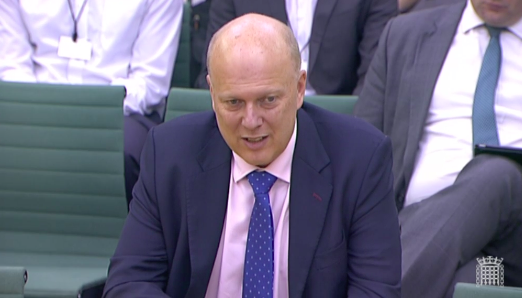Monarch collapse: owners have 'moral obligation to contribute' to airlift costs

Next time an airline collapses, the taxpayer may once again pick up the bill for bringing passengers home, the Transport Secretary has said.
Chris Grayling was facing questions from members of the Transport Select Committee about the collapse of Monarch earlier this month. The repatriation exercise, which ended in the early hours of Monday morning, cost £60m — a price of £550 per passenger.
At the end of a working day that had begun at 6am with a delayed inaugural Intercity Express train from Bristol to Paddington, Mr Grayling denied that the airlift had set a precedent. But he conceded: “It's perfectly possible we may do the same in future.”
“I don’t think it’s desirable that it should happen again,” he said.
After speculation that Greybull Capital, the owners of Monarch, may have been able to take cash out of the business, Mr Grayling said the firm had a “moral obligation to contribute” to the cost of the airlift.
“I would hope that if any of the creditors end up with money in their pocket, whether they might indeed consider doing that.”
In response to questioning about the failure, the Transport Secretary revealed more details about the days leading to the collapse of the airline.
“The company approached us on the Tuesday [six days] before it went into administration to ask for a bridging loan so it could develop a long-haul, low-cost airline.
“Two days later we were told it wasn’t going to pursue that avenue.”
Two days after that, on Saturday 30 September, the directors decided to place Monarch in administration. The airline was not grounded immediately, but as The Independent revealed early on Sunday 1 October, fares were suddenly quadrupled to deter people from buying tickets.
The travel industry has widely criticised the decision to launch a rescue airlift and seek to recover some of the cash from tour operators who have already paid ATOL contributions. Some have said that Monarch should have been kept afloat long enough to mount the rescue effort, rather than chartering in jets from the US, Canada and Qatar.
But Mr Grayling said that the Government would have been exposed to indeterminate expense: “The advice is that we would need to take on all the liabilities of the airline.”
Foreign creditors of Monarch could have impounded the aircraft, he said. “You can’t prevent an international airport taking that sort of action.”
Mr Grayling also criticised the behaviour of Ryanair after the airline cancelled thousands of flights, and then was ordered by the CAA to clarify passengers rights.
“I don’t think it was a triumphant period in the history of Ryanair,” said the Transport Secretary. “They have some reputation rebuilding to do.” And he warned: “The Civil Aviation Authority will be tough if it happens again.”
Ryanair says it has now processed 96 per cent of refunds or re-routing requests from customers affected by the winter schedule change. The airline’s Marketing Director, Kenny Jacobs, said: “We once again apologise to all customers affected by these cancellations and winter schedule changes. These painful and deeply regretted winter schedule reductions have restored our industry-leading punctuality.
“Customers can now book our low fare flights confident that there is no danger of further roster related flight cancellations.”

